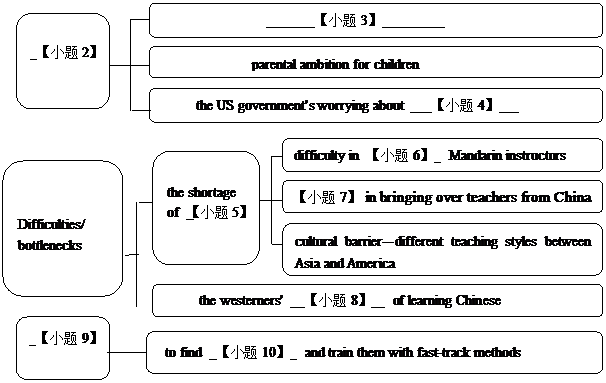题目内容
Barrier Islands
 Texas has an extensive coastline that runs along the Gulf of Mexico. If you look closely at the map, you’ll notice that there are narrow islands located just off the coast of Texas. These are called barrier islands.
Texas has an extensive coastline that runs along the Gulf of Mexico. If you look closely at the map, you’ll notice that there are narrow islands located just off the coast of Texas. These are called barrier islands.
Barrier islands stretch along about 15 percent of the world’s coastlines. They are separated from the mainland by a shallow body of water. Some barrier islands spread out for more than 100 miles. In Texas, some of the largest barrier islands include Galveston Island, Mustang Island, and Padre Island.
Barrier islands are fragile(脆弱的) areas that contain an interdependent community of land, plants, and animals. All three need each other to exist. If one is harmed in some way, then the other two can suffer. For example, barrier islands are in constant danger of erosion, or loss of land, from wind, waves, and people. The steady movement of ocean waves and wind moves sand along the beaches. This movement contributes to erosion, which changes the shape and size of a barrier island over time. Plants not only provide animals with food and shelter, but it also helps keep an island’s sand and soil in place. When people pick native plants, it advances the process of erosion. This can harm the environmental balance that keeps an island’s ecosystem healthy. For this reason, visitors to barrier islands are usually warned to leave plants alone and to stay on roads and public beaches so that the land, plants, and animals are not disturbed.
As their name suggests, barrier islands provide a natural barrier that helps block the mainland from very bad weather such as strong windstorms and hurricanes. This protection saves lives, homes, and money every year. Barrier islands are also a major source of income for an area’s economy. Padre Island, for example, is visited every year by hundreds of thousands of tourists who take advantage of its sandy beaches and beautiful waters that are perfect for swimming, boating, and fishing. The dollars that tourists spend on the island help financially support the region and state.
1.Paragraph 3 is mostly about _____________.
A.what barrier islands are like B.how barrier islands form
C.how barrier islands can exist D.why barrier islands are important
2.Which of the following can do harm to barrier islands?
A.Keeping plants wherever they are. B.Going wherever visitors like.
C.Fishing on public beaches. D.Driving about on roads.
3.We can tell from the article that the author ___________.
A.lives on Padre Island and loves it
B.cares about the ecosystem on barrier islands
C.wishes less and less travelers would visit barrier islands
D.is concerned about the beautiful waters around the islands
4.Barrier islands are important because they ___________.
A.help prevent bad weather damaging mainland
B.bring in much more money than mainland
C.can protect rare plants and animals
D.provide more shelters for people
CBBA

 学练快车道快乐假期寒假作业系列答案
学练快车道快乐假期寒假作业系列答案 新思维寒假作业系列答案
新思维寒假作业系列答案Nowadays, studying abroad gains popularity in China. Many rich parents would rather send their children abroad to receive education than let them be educated in China.
As every coin has two sides, studying abroad is not an exception. There are advantages for people to attend school abroad. In the first place, he can use the foreign language in his daily life so that his ability in the second language may be greatly improved, as it is obvious that there is no better chance to improve second-language than living in the country where it is spoken. While studying in a foreign country, he will most likely meet many others from overseas and it is possible to make friends from all over the world. This is not only exciting on the social level, but could lead to important overseas contacts in his career as well. He can get familiar with the latest knowledge in science and make use of the first-rate facilities (设备) available. In this way, there is every chance that he is able to widen his horizon (眼界) and broaden his mind.
Of course, attending schools abroad may bring about a series of problems. The most serious problem is language barrier (障碍). Most of the students who go abroad don’t have enough skills in the language spoken there. As a result, on arriving there, they will find it difficult to understand what the teachers say. Besides, for lack of knowledge of the customs of the local people, they may constantly run into trouble in dealing with various situations.
Therefore, given an opportunity to attend a school abroad, one must consider both sides of the factors carefully before making up his mind.
|
Title: Studying Abroad |
|
|
Phenomenon |
Sending children abroad to receive education is (1) __________ with many rich parents. |
|
Advantages |
● Children have the (2) ________ chance to improve the second language because they can use it (3) ___________. ● They can make friends with other students from (4)____________. ● They can (5)__________ of the latest knowledge in science and have access to the best facilities. |
|
(6)____________ |
● Language barrier is the number one problem. Because students are not (7)___________ at the language spoken there, they will have difficulty in (8)____________ what the teachers say. ● It is not easy for them to deal with cross-culture communication (9)________ to lack of knowledge of the customs of the locals. |
|
Conclusion |
Both sides of the factors should be (10)______________ carefully before one makes a decision. |

